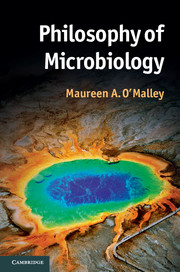Book contents
- Frontmatter
- Contents
- List of figures and tables
- Acknowledgements
- An introduction to philosophy of microbiology
- Chapter 1 Philosophy in microbiology; microbes in philosophy
- Chapter 2 Philosophical debates in high-level microbial classification
- Chapter 3 Philosophical debates in species-level microbial classification
- Chapter 4 Philosophical issues in microbial evolution
- Chapter 5 Microbial ecology from a philosophical perspective
- Chapter 6 Microbes as model biological systems
- Conclusion: further philosophical questions
- Glossary
- References
- Index
Chapter 3 - Philosophical debates in species-level microbial classification
Published online by Cambridge University Press: 05 September 2014
- Frontmatter
- Contents
- List of figures and tables
- Acknowledgements
- An introduction to philosophy of microbiology
- Chapter 1 Philosophy in microbiology; microbes in philosophy
- Chapter 2 Philosophical debates in high-level microbial classification
- Chapter 3 Philosophical debates in species-level microbial classification
- Chapter 4 Philosophical issues in microbial evolution
- Chapter 5 Microbial ecology from a philosophical perspective
- Chapter 6 Microbes as model biological systems
- Conclusion: further philosophical questions
- Glossary
- References
- Index
Summary
The species debate forms a deep undercurrent in microbiology, both historically and in contemporary practice. This chapter will outline those disagreements in light of the microbial characteristics that frustrate universal species concepts and even consistent practical definitions. An environmentally oriented approach to classification is an alternative that emerges in the aftermath of these debates. It points to the causal capacities of larger functional groups of microorganisms.
Species as the unit of microbial evolution
The concept of species has a long and troubled history in microbiology. Microbiologists have made considerable efforts over the last century to find a ‘natural’ classification system. Scientists, historians and philosophers have frequently remarked about the difficulties of doing so. Without recapitulating too much of this well-known debate, I will summarize the issues and assess where microbiology is today in regard to the elusive concept of species – and more practically important, the operational definitions employed – in order to work out how much this conceptual status matters to classification practice.
A short history of species classification in bacteriology
One way of parsing the entire history of microbiology is as a history of the quest for species and the right species concept. Until the 1770s, says historian Marc Ratcliff, ‘animalcules did not exist as species, but only as specimens’ (2009: 190). Many of the most famous early observers of microorganisms, including van Leeuwenhoek, did not name a single type of microbe. Instead, they referred to the organisms they observed in only the broadest and most colloquial terms.
- Type
- Chapter
- Information
- Philosophy of Microbiology , pp. 65 - 94Publisher: Cambridge University PressPrint publication year: 2014

